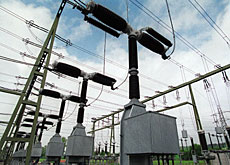Economic worries drove Swiss to vote no

Fear and uncertainty prompted the Swiss to throw out government proposals to liberalise electricity and to spend gold money on good causes, say newspapers.
They took the view that the economic downturn, and not selfishness, was the reason the Swiss refused to share their gold windfall.
The papers saw the double thumbs down on Sunday as a stinging blow to the government, which had campaigned hard for electricity liberalisation and to have proceeds from the sale of excess gold reserves spent on good causes.
“A Switzerland on the defensive,” ran the headline in Le Temps.
“The Swiss, disarmed by the financial crisis, economic collapse and questions about pension provision, took fright and voted defensively,” it added.
Big surprise
According to the French-language daily, the rejection of plans to open up the electricity market was the big surprise of the weekend.
“We knew that French-speaking Switzerland would reject the new law, but we thought that German-speaking Switzerland would achieve a sufficient margin to make the project pass.”
The Bern paper, Der Bund, was also taken by surprise by the 52.6 per cent vote against opening up the market.
“It was not just the rejection which was surprising, but where the no votes came from,” the paper wrote. “In western Switzerland the no-vote was to be expected, but now most of the eastern Swiss cantons have also rejected it.”
“The unions have won a clear victory,” Zurich’s Tages Anzeiger wrote. “The people’s no to the electricity law is not just a no to the opening up of the market. It is also a clear signal against liberalisation in general.”
The Neue Zürcher Zeitung believed the economic situation had played a role in dissuading voters from adopting change: “Bad news from the international economy and the hubris of certain managers did not create the confidence… needed to bring a well-functioning state electricity system closer to the international market.”
Pyrrhic victory
Le Temps warned that the clear rejection of the electricity initiative could be a “pyrrhic victory” for opponents of market liberalisation.
Proponents of the new law maintained that it was aimed at regulating liberalisation. Without it, it would be much harder for parliament to control the opening up of the market, the paper argued.
The fact that the Swiss turned down the People’s Party’s initiative on giving all the proceeds from gold sales to the pension scheme surprised no one.
Selfish Swiss?
But there was general consternation at the short-shrift given by voters to the government’s counter proposal that the money be split between the state pension scheme, the cantons and a solidarity foundation to help the needy in Switzerland and abroad.
“Does the no to the solidarity foundation mean that the Swiss are self-centred?” asked Der Bund, before providing its own answer: “We are neither more heartless nor more generous than other people. But in times of economic crisis and falling pension reserves many of us think first of ourselves.”
“The fact that the Swiss people did not show any confidence in the solidarity foundation is regrettable, but excusable,” the Tages Anzeiger wrote.
“It had two main problems: first it was launched in the middle of the Holocaust debate. And secondly, many people remained unsure about what the money would actually be used for.”
The mass-circulation Blick added another reason for the failure of the proposal. It said another proposal by the rightwing Swiss People’s Party proposal to spend all the money on pensions had convinced more people than expected, even though it too was rejected.
But the paper managed to derive some optimism from the outcome.
“The solidarity foundation is dead,” it concluded. “But we can still learn from our mistakes!”
swissinfo
Commentators take the view that economic uncertainty was behind voters’ decision to reject electricity deregulation and their refusal to share their gold windfall with the needy.
The press saw the double thumbs down on Sunday as a stinging blow to the government, which had campaigned hard for both issues.
The rejection of the electricity proposal is being seen as a sign of hostility towards liberalisation in general.
Outside pressure during the scandal over Switzerland’s Holocaust-era role is thought to have contributed to sinking the “Solidarity Foundation”, which would have supported good causes abroad and at home.

In compliance with the JTI standards
More: SWI swissinfo.ch certified by the Journalism Trust Initiative



You can find an overview of ongoing debates with our journalists here . Please join us!
If you want to start a conversation about a topic raised in this article or want to report factual errors, email us at english@swissinfo.ch.